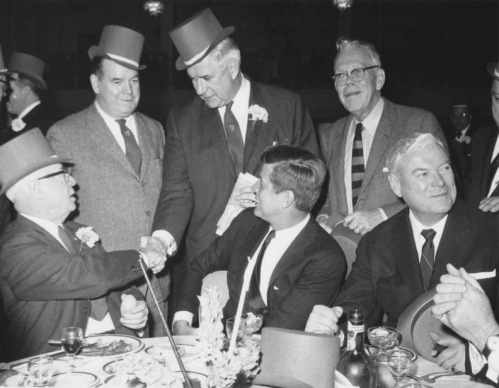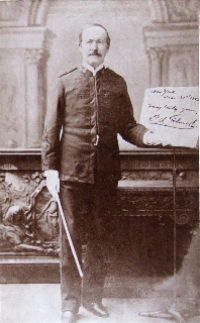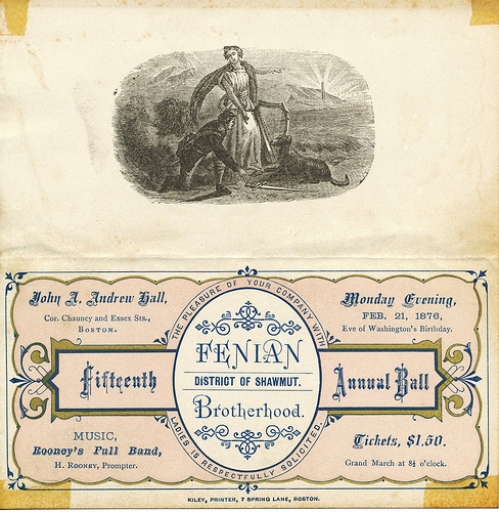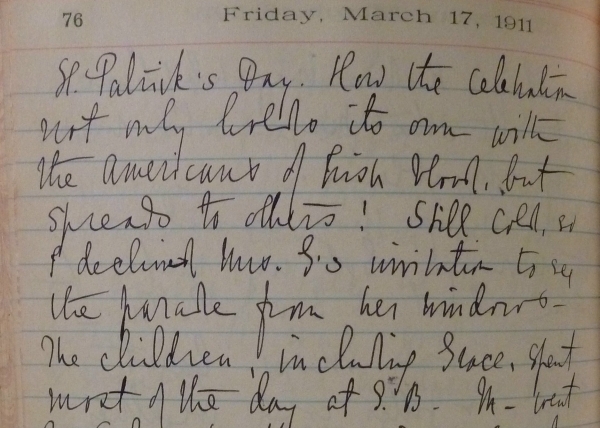Exploring Boston Irish Connections
Among the Burns Library’s world-renowned Irish collections are Boston-based materials covering a wide range of themes, from architecture, literature, and music to religion, politics, and immigration. The collections below represent just a few of the library’s many research materials that help document Irish contributions to Boston’s history.
Thomas P. O’Neill Papers, 1936-1994
Congressman Tip O'Neill was born in North Cambridge, Massachusetts in 1912, and conducted his first run for office while attending Boston College. From 1936 to 1952 he served in the Massachusetts State Legislature, rising to become the first democratic Speaker of this assembly. From 1953 to 1986 he was a member of the United States House of Representatives, serving as Speaker of the House from 1977 to 1986. Tip was a proud Irish-American who worked tirelessly for his constituents and actively supported human rights issues.

Tip O'Neill with John F. Kennedy
Material in the Tip O’Neill Papers relates to O'Neill's career in Congress, and documents his views on such issues as the Vietnam War, Watergate, and relations with Ireland. Letters include correspondence with presidents Ronald Reagan, John Fitzgerald Kennedy, and Jimmy Carter. The O’Neill Library at Boston College is named for Tip O’Neill.
More information about this collection: Holmes One Search; online finding aid.
Related links: Tip O'Neill Photographs, Digital Collection; Thomas P. O'Neill, Library Exhibit; Tip O'Neill Permanent Exhibit
Michael Cummings Collection of P.S. Gilmore Materials, 1850-2004

P.S. Gilmore with baton, ca. 1882.
Born in Ballygar, County Galway, Ireland in 1829, Patrick Sarsfield Gilmore is considered to be the "Father of the American Concert Band." Cornet player, band leader, composer, and impresario, Gilmore had two giant coliseums built in Boston for his music festivals, the first in 1869 for the National Peace Jubilee (1869) and another in 1872 for the World Peace Jubilee (1872).
Gilmore also composed several pieces of music, including "When Johnny Comes Marching Home," first published by Henry Tolman and Company of Boston in 1863. The melody of this song is related to the melody of the Irish song "Johnny, I Hardly Knew Ye." The Burns Library's collection of Gilmore materials was assembled by Michael Cummings of Milton, Massachusetts and includes programs, lithographs, tickets, medals, correspondence, and other items.
More information about this collection: Holmes One Search; online finding aid.
Related links: Somewhere a Voice is Calling, Library Exhibit; Patrick Sarsfield Gilmore, Library Exhibit
Michael Healy Sermons, 1835-1840

In 2004, a processing assistant solved the mystery surrounding a 19th-century manuscript of sermons held by the Burns Library. The author of this anonymous manuscript was revealed to have been Fr. Michael Healy, who was born in 1807 or 1808 in Kilkenny, Ireland and became a diocesan priest in Boston. The handwritten sermons cover topics such as the Festival of St. Patrick, repentance, communion, Nativity, obedience to parents, judgment, and the love of God.
Upon ordination, Fr. Healy worked briefly with the Passamaquoddy community in Maine before relocating to New Hampshire and then to Boston. During his seven years in Boston (1833-1840), he served at the Cathedral of the Holy Cross and at St. Mary’s Church in the North End. In 1838, The Pilot wrote of him, “Few, if any, in the Diocese can surpass him in pulpit oratory. We congratulate the congregation of St. Mary’s on the addition of so valuable a pastor.” Fr. Healy died in Montreal in 1840.
More information about this collection: Holmes One Search; online finding aid.
George D. Cahill Papers, 1857-1920
Cahill was active in Irish nationalist activities in America, particularly in greater Boston. Born in Ireland, Cahill can be traced by 1850 to Quincy, Massachusetts. Described in a Boston Globe obituary as one of Quincy’s best known citizens and a staunch democrat, Cahill, who had been ill, died in 1893 after collapsing at a city council meeting. Cahill belonged to the Irish National League of America, serving as president of the Quincy branch and as Centre (leader) of the Fenian Brotherhood Circle in Quincy.

Shawmut District Fenian Brotherhood Ball invitation, 1876
Materials in this collection include records from meetings of these two nationalist groups, as well as correspondence pertaining to organizations such as Clan na Gael and the United Irish Brotherhood.
More information about this collection: Holmes One Search.
Related links: View images from this collection via Flickr.
James Prendergast Family Correspondence, 1840-1850
Letters from James and Elizabeth Prendergast in Ireland to their children in Boston offer an intimate look into the lives of both groups. During a time of famine and distress in Ireland, letters from Milltown, County Kerry relate the health – and illness – of family members, along with accounts of births, marriages, and deaths. The letters also provide information about extended family and neighbors. In 2006, Burns Library archives assistant Shelley Barber produced an edited version of this special collection for the book, The Prendergast Letters.
More information about this collection: Holmes One Search; online finding aid.
Related links: Check out the book, The Prendergast Letters from the Libraries.
Charles Maginnis Collection, 1902-1986

Charles Maginnis
Specializing in Catholic Church architecture, the firm of Maginnis and Walsh was the winner of a contest in 1909 to determine who would design the first buildings on Boston College's Chestnut Hill campus. Charles Donagh Maginnis was born in Ulster in 1867 and educated in Dublin. In 1885 he came to the United States and worked in several architectural firms before co-founding the architectural firm with Timothy F. Walsh.
The collection includes correspondence, publications, manuscripts, architectural notes and drawings, photographs, a scrapbook, and other items. It serves as an introduction to the work of the firm, whose archives are held by the Fine Arts Department of the Boston Public Library.
More information about this collection: Holmes One Search.
Katherine E. Conway Papers, 1874-1926
In 1883, noted journalist and poet Katherine Conway became the first woman editor of The Pilot, the Boston-based newspaper that published for a Catholic and Irish-American audience. John Boyle O’Reilly, previous editor and a poet in his own right, recognized the quality of Conway’s work and offered her the position of editor. Conway was born in 1852 in Rochester, New York to Irish parents.

Diary page from Katherine Conway
The Katherine Conway papers include correspondence, speeches, diaries and photographs, as well as an article about Boston mayor John Fitzgerald, father of Rose Fitzgerald Kennedy and grandfather of President John F. Kennedy.
More information about this collection: Holmes One Search.
For more information, e-mail burnsref@bc.edu or telephone 617-552-4861. The web pages for Getting Started with Irish Studies Research and the Burns Library provide helpful resources as well.
















